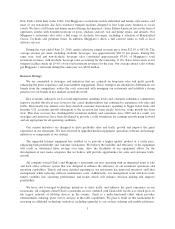Chili's 2014 Annual Report Download - page 18
Download and view the complete annual report
Please find page 18 of the 2014 Chili's annual report below. You can navigate through the pages in the report by either clicking on the pages listed below, or by using the keyword search tool below to find specific information within the annual report.Changes in governmental regulation may adversely affect our ability to maintain our existing and future
operations and to open new restaurants.
We are subject to the Fair Labor Standards Act (which governs such matters as minimum wages, overtime
and other working conditions), along with the Americans with Disabilities Act, the Immigration Reform and
Control Act of 1986, various family leave mandates and a variety of other laws enacted, or rules and regulations
promulgated by federal, state and local governmental authorities that govern these and other employment
matters, including, tip credits, working conditions, safety standards and immigration status. We have experienced
and continue to expect adjustments in payroll expenses as a result of federal and state mandated increases in the
minimum wage; we cannot be certain there will be no additional significant increases in the future. Enactment
and enforcement of various federal, state and local laws, rules and regulations on immigration and labor
organizations may adversely impact the availability and costs of labor for our restaurants in a particular area or
across the United States. Other labor shortages or increased team member turnover could also increase labor
costs. In addition, our suppliers may be affected by higher minimum wage standards or availability of labor,
which may increase the price of goods and services they supply to us. We continue to review the Affordable Care
Act and regulations issued related to the law to evaluate the potential impact of this law on our business, and to
accommodate various parts of the law as they take effect. There are no assurances that a combination of cost
management and price increases can accommodate all of the costs associated with compliance.
We are subject to laws and regulations, which vary from jurisdiction to jurisdiction, relating to nutritional
content and menu labeling. Compliance with these laws and regulations may lead to increased costs and
operational complexity, changes in sales mix and profitability, and increased exposure to governmental
investigations or litigation. We do not expect to incur material costs from compliance with the provision of the
Affordable Care Act requiring disclosure of calories on the menus, but cannot reliably anticipate any changes in
guest behavior resulting from implementation of this portion of the law, which could have adverse effects on our
sales or results of operations.
Each of our company-owned and our franchisees’ restaurants is also subject to licensing and regulation by
alcoholic beverage control, health, sanitation, safety and fire agencies in the state, county and/or municipality
where the restaurant is located. We generally have not encountered any material difficulties or failures in
obtaining and maintaining the required licenses and approvals that could impact the continuing operations of an
existing restaurant, or delay or prevent the opening of a new restaurant. Although we do not, at this time,
anticipate any occurring in the future, we cannot be certain that we, or our franchisees, will not experience
material difficulties or failures that could impact the continuing operations of an existing restaurant, or delay the
opening of restaurants in the future.
We are also subject to federal and state environmental regulations, and although these have not had a
material negative affect on our operations, we cannot ensure this will not occur in the future. In particular, the
U.S. and other foreign governments have increased focus on environmental matters such as climate change,
greenhouse gases and water conservation. This may lead to new initiatives directed at regulating an as-yet-
unspecified array of environmental matters. These efforts could result in increased taxation or in future
restrictions on or increases in costs associated with food and other restaurant supplies, transportation costs and
utility costs, any of which could decrease our operating profits and/or necessitate future investments in our
restaurant facilities and equipment to achieve compliance. Further, more stringent and varied requirements of
local and state governmental bodies with respect to zoning, land use and environmental factors could delay,
prevent or make cost prohibitive the continuing operations of an existing restaurant or the development of new
restaurants in particular locations.
Due to our international franchising, we are also subject to governmental regulations throughout the world
impacting the way we do business with our international franchisees and joint venture partners. These include
antitrust and tax requirements, anti-boycott regulations, import/export/customs and other international trade
regulations, the USA Patriot Act and the Foreign Corrupt Practices Act. Failure to comply with any such legal
11
























